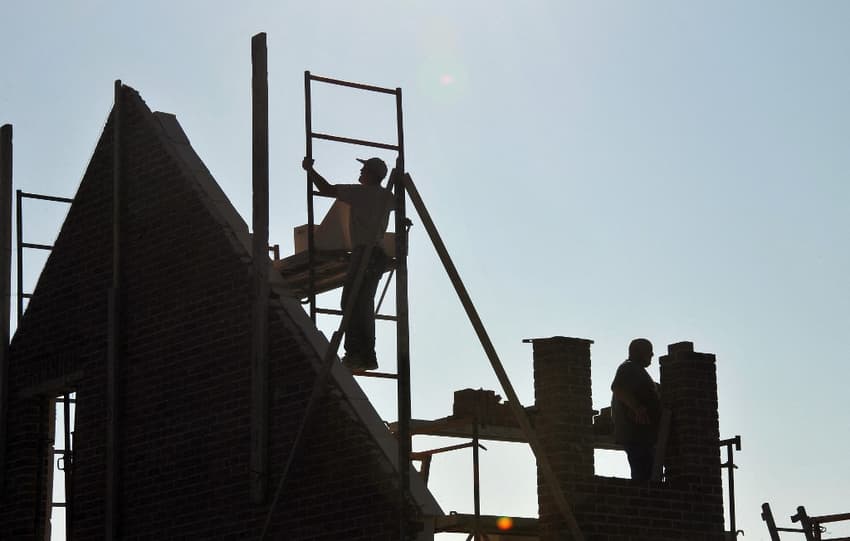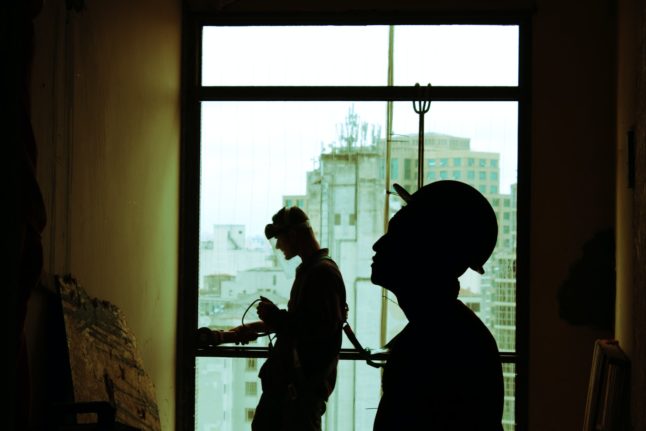Italy's building superbonus: How will it change after the election?

Time is running out for homeowners to claim Italy's 'superbonus 110'. Would a new government consider extending deadlines or increasing funds for the popular renovation discount scheme?
Italy’s so-called superbonus 110 was introduced almost two years ago, offering generous discounts to homeowners planning renovation work.
Offering a potential rebate of up to 110 percent of the cost of works which increase a property’s energy efficiency or reduce the risk of earthquake damage, the superbonus has been unsurprisingly popular.
READ ALSO: Is this the end of Italy’s building ‘superbonus’?
But Italy's current, outgoing government has been critical of the scheme, and has not shown any interest in extending it beyond deadlines looming at the end of 2022.
This timeframe is proving incredibly worrying for homeowners now unsure if they can get works completed, with many reporting spiralling costs and difficulties in claiming the funds.
With an early general election set for September 25th, some are now pinning their hopes on a new government making amendments to, or even refinancing, the superbonus.
What’s the problem with the superbonus?
The biggest issue now is that some banks have stopped buying credit – and therefore lending – in recent months, due to increasingly complex bureaucracy and confusion over the procedure for accessing the bonus.
Billions of euros’ worth of fraudulent claims led the government to introduce stricter rules on accessing the fund, which has in many cases blocked access to credit for months, stalling renovation projects.
The increasing difficulty of obtaining credit has caused ever-worsening supply chain issues.
These setbacks have left many homeowners concerned about whether they’ll able to finish their renovation projects in time and caused some to abandon their plans altogether.
The superbonus, introduced by the previous government, has already been claimed in excess - so far costing the state at least €400 million more than was originally allocated - and current prime minister Mario Draghi has been critical of the scheme.
Homeowners in the midst of renovations are now holding out hope that a change of government could bring, if not a further extension to the timeframe, amendments which would open up lines of credit and allow them to complete their works - hopefully before the existing deadlines.
READ ALSO: The hidden costs of buying a home in Italy
As things stand, single-family home owners are almost out of time: most will have until September 30th to complete 30 percent of renovation works, with a final deadline of December 31st, 2022 for all works to be finished.
Those renovating certain other types of buildings, or those in areas with higher seismic risk, have until 2025 to claim funds, with declining amounts available each year - though plans for the future financing for this still aren’t clear.

The credit transfer system is hampering access to Italy's 'superbonus 110'. Photo by Guilherme Cunha on Unsplash
Where do Italy’s political parties stand on the superbonus?
None of the main parties have said they want to scrap the superbonus altogether, but nor have they made any firm pledges to extend it.
Parties which have mentioned the superbonus in their election manifestos have simply proposed potential amendments to streamline the claim process and make it easier for all parties to transfer credit, without going into specifics.
The right-wing coalition likely to take power after the election - Brothers of Italy, the League, and Forza Italia - has expressed somewhat ambiguous views on Italy’s various building bonuses.
The alliance’s joint manifesto suggests the "reorganisation of incentives intended for the redevelopment, safety and energy efficiency of public and private residential buildings", while also saying there’s a need to "safeguard existing situations".
EXPLAINED: Who’s who in Italy’s general election?
The League states that it wants to guarantee "access to tax relief for all subjects who have acquired the right to the superbonus", but at the same time to "make the superbonus more coherent and applicable, reconciling the need to limit the burden borne by the state with the need for energy requalification and anti-seismic upgrades".
Forza Italia meanwhile proposes the “rationalisation and simplification of the legislation on building incentives, energy efficiency and the sismabonus”, suggesting "making it structural" - though it’s unclear what this means, and no further detail was given.
The biggest supporter of the scheme is, perhaps unsurprisingly, the Five Star Movement headed by Giuseppe Conte, the former prime minister who first introduced the superbonus in 2020.
Five Star has made restructuring the superbonus one of its flagship election pledges. Its manifesto says “stabilising” the scheme is necessary for "the planning of investments in real estate and continuing to improve the levels of energy savings and consequently savings on bills".

Current Five Star Movement leader Giuseppe Conte. Photo by Alberto PIZZOLI / AFP.
It says the credit transfer issue must be resolved by "unblocking and distributing tax credits to prevent the bankruptcy of companies that are still unable to turn credit into liquidity to pay suppliers and employees".
The only parties thought likely to want to get rid of the superbonus, or to significantly reduce incentives, are the centrist parties Italia Viva and Azione which make up the so-called terzo polo.
While they don’t explicitly mention the superbonus in their manifesto and have remained silent on the topic so far, the parties are in line with Draghi’s critical position on similar issues, points out newspaper Corriere della Sera.
Meanwhile the Democratic Party (PD) leading the centre-left alliance has not mentioned the superbonus in its election campaigning so far, and its opinion on the matter remains unclear.
READ ALSO: What election promises have Italy’s political parties made so far?
The question of how the government will foot the bill for the already overrun budget remains unanswered, with news reports suggesting more financing will be needed before the end of 2022.
Parties’ views on the issue may become clearer next week, when a long-awaited extension to the government’s financial aid decree is expected to be agreed.
The Senate is set to debate new emergency aid measures again on Tuesday, September 13th, after disagreements between parties led to a postponement on September 7th.
The Local will continue to report updates as things change.
Please note that The Local cannot advise on individual cases. For more information on claiming Italy's building bonuses please consult a qualified building surveyor or financial advisor.
See more articles in our Italian property section.
Comments
See Also
Italy’s so-called superbonus 110 was introduced almost two years ago, offering generous discounts to homeowners planning renovation work.
Offering a potential rebate of up to 110 percent of the cost of works which increase a property’s energy efficiency or reduce the risk of earthquake damage, the superbonus has been unsurprisingly popular.
READ ALSO: Is this the end of Italy’s building ‘superbonus’?
But Italy's current, outgoing government has been critical of the scheme, and has not shown any interest in extending it beyond deadlines looming at the end of 2022.
This timeframe is proving incredibly worrying for homeowners now unsure if they can get works completed, with many reporting spiralling costs and difficulties in claiming the funds.
With an early general election set for September 25th, some are now pinning their hopes on a new government making amendments to, or even refinancing, the superbonus.
What’s the problem with the superbonus?
The biggest issue now is that some banks have stopped buying credit – and therefore lending – in recent months, due to increasingly complex bureaucracy and confusion over the procedure for accessing the bonus.
Billions of euros’ worth of fraudulent claims led the government to introduce stricter rules on accessing the fund, which has in many cases blocked access to credit for months, stalling renovation projects.
The increasing difficulty of obtaining credit has caused ever-worsening supply chain issues.
These setbacks have left many homeowners concerned about whether they’ll able to finish their renovation projects in time and caused some to abandon their plans altogether.
The superbonus, introduced by the previous government, has already been claimed in excess - so far costing the state at least €400 million more than was originally allocated - and current prime minister Mario Draghi has been critical of the scheme.
Homeowners in the midst of renovations are now holding out hope that a change of government could bring, if not a further extension to the timeframe, amendments which would open up lines of credit and allow them to complete their works - hopefully before the existing deadlines.
READ ALSO: The hidden costs of buying a home in Italy
As things stand, single-family home owners are almost out of time: most will have until September 30th to complete 30 percent of renovation works, with a final deadline of December 31st, 2022 for all works to be finished.
Those renovating certain other types of buildings, or those in areas with higher seismic risk, have until 2025 to claim funds, with declining amounts available each year - though plans for the future financing for this still aren’t clear.

Where do Italy’s political parties stand on the superbonus?
None of the main parties have said they want to scrap the superbonus altogether, but nor have they made any firm pledges to extend it.
Parties which have mentioned the superbonus in their election manifestos have simply proposed potential amendments to streamline the claim process and make it easier for all parties to transfer credit, without going into specifics.
The right-wing coalition likely to take power after the election - Brothers of Italy, the League, and Forza Italia - has expressed somewhat ambiguous views on Italy’s various building bonuses.
The alliance’s joint manifesto suggests the "reorganisation of incentives intended for the redevelopment, safety and energy efficiency of public and private residential buildings", while also saying there’s a need to "safeguard existing situations".
EXPLAINED: Who’s who in Italy’s general election?
The League states that it wants to guarantee "access to tax relief for all subjects who have acquired the right to the superbonus", but at the same time to "make the superbonus more coherent and applicable, reconciling the need to limit the burden borne by the state with the need for energy requalification and anti-seismic upgrades".
Forza Italia meanwhile proposes the “rationalisation and simplification of the legislation on building incentives, energy efficiency and the sismabonus”, suggesting "making it structural" - though it’s unclear what this means, and no further detail was given.
The biggest supporter of the scheme is, perhaps unsurprisingly, the Five Star Movement headed by Giuseppe Conte, the former prime minister who first introduced the superbonus in 2020.
Five Star has made restructuring the superbonus one of its flagship election pledges. Its manifesto says “stabilising” the scheme is necessary for "the planning of investments in real estate and continuing to improve the levels of energy savings and consequently savings on bills".

It says the credit transfer issue must be resolved by "unblocking and distributing tax credits to prevent the bankruptcy of companies that are still unable to turn credit into liquidity to pay suppliers and employees".
The only parties thought likely to want to get rid of the superbonus, or to significantly reduce incentives, are the centrist parties Italia Viva and Azione which make up the so-called terzo polo.
While they don’t explicitly mention the superbonus in their manifesto and have remained silent on the topic so far, the parties are in line with Draghi’s critical position on similar issues, points out newspaper Corriere della Sera.
Meanwhile the Democratic Party (PD) leading the centre-left alliance has not mentioned the superbonus in its election campaigning so far, and its opinion on the matter remains unclear.
READ ALSO: What election promises have Italy’s political parties made so far?
The question of how the government will foot the bill for the already overrun budget remains unanswered, with news reports suggesting more financing will be needed before the end of 2022.
Parties’ views on the issue may become clearer next week, when a long-awaited extension to the government’s financial aid decree is expected to be agreed.
The Senate is set to debate new emergency aid measures again on Tuesday, September 13th, after disagreements between parties led to a postponement on September 7th.
The Local will continue to report updates as things change.
Please note that The Local cannot advise on individual cases. For more information on claiming Italy's building bonuses please consult a qualified building surveyor or financial advisor.
See more articles in our Italian property section.
Join the conversation in our comments section below. Share your own views and experience and if you have a question or suggestion for our journalists then email us at [email protected].
Please keep comments civil, constructive and on topic – and make sure to read our terms of use before getting involved.
Please log in here to leave a comment.